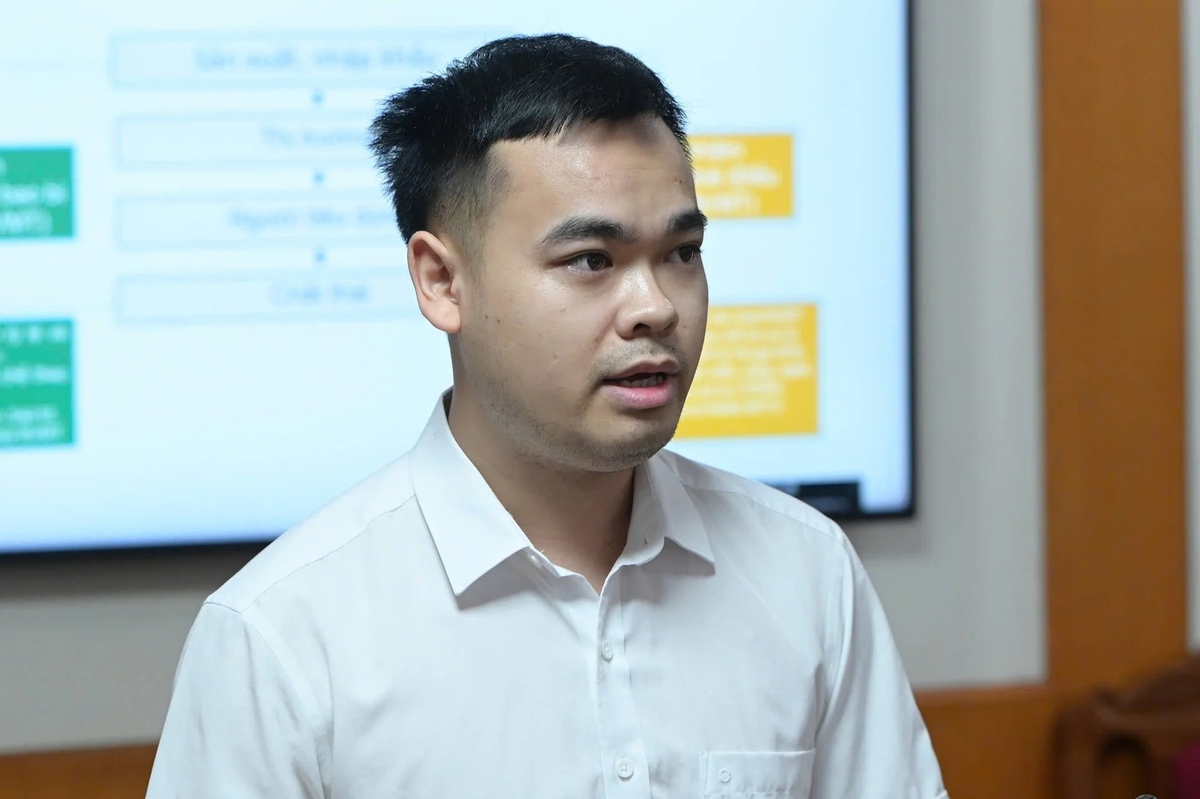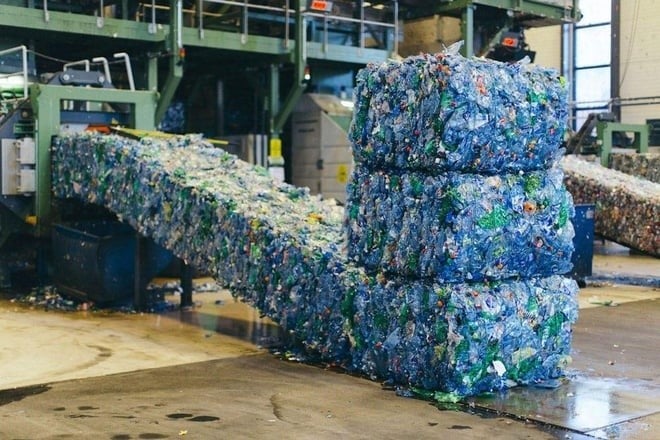June 6, 2025 | 00:45 GMT +7
June 6, 2025 | 00:45 GMT +7
Hotline: 0913.378.918
June 6, 2025 | 00:45 GMT +7
Hotline: 0913.378.918
According to the content about extended producer responsibility (EPR), which was fully stipulated in the Law on Environmental Protection 2020, extended producer responsibility (EPR) is an environmental policy that requires producing and importing businesses to collect, process, or make financial contributions to recycle products and packaging that they have brought to the market.

Mr. Nguyen Van Phan, EPR Office, emphasized that the full and timely declaration of recycling and waste treatment responsibility is a mandatory requirement for businesses. Photo: Tung Dinh.
Before specific regulations on extended producer responsibility (EPR) were issued, most of the packaging after use was discharged directly into the environment. However, when Vietnam promoted the circular economy model, especially since the Law on Environmental Protection 2020 took effect, producers and importers have been forced to recycle or make financial contributions to the Environmental Protection Fund.
"One of the important changes of Decree No. 05/2025/ND-CP newly issued is the clear stipulation on excluding EPR liability for some groups of packaging producers and importers. Including producers and importers with sales revenue from products belonging to the packaging group of less than VND 30 billion/year," said Mr. Nguyen Van Phan, EPR Office.
Specifically, according to Decree No. 05/2025/ND-CP newly issued, the responsibility of producers and importers is divided into two contents. For recycling responsibility, producers of tires, lubricants, batteries, accumulators, and some types of packaging are responsible for recycling from January 1, 2024. Producers and importers of electrical and electronic products are responsible for recycling from January 1, 2025; and producers and importers of transport vehicles are responsible for recycling from January 1, 2027.
For the responsibility of collecting and treating waste, producers and importers of disposable battery products, diapers, gum, tobacco, some synthetic plastic products, and pesticide packaging are responsible for collecting and treating waste from January 1, 2022. Packaging, rechargeable batteries, accumulators, lubricants, tires, electrical and electronic products, and transport vehicles are in the category of mandatory EPR contribution. In particular, packaging producers and importers are mainly affected.
In addition, Decree No. 05 also stipulates the mandatory recycling rate, which is the rate of minimum product and packaging volume that must be collected and recycled according to the compulsory recycling specifications in the implementation year. The Ministry of Agriculture and Environment will gradually increase this rate every 3 years.

Businesses need to understand the EPR regulations to perform the responsibility of recycling and treating packaging and products after use in accordance with the roadmap.
The business's financial contribution to the Environmental Protection Fund is determined by the formula F = R x V x Fs, in which R is the mandatory recycling rate; V is the amount of product and packaging brought to the market; and Fs is the recycling cost norm. Fs is revised under Circular No. 07/2025/TT-BTNMT dated February 28, 2025. For example, as for paper and carton packaging, Fs is 1.938; as for aluminum packaging, Fs is 2.448; and as for iron and other metal packaging, Fs is 3.672.
"Businesses pay attention to declaring and sending the declaration of financial contributions to support waste treatment on the national EPR information system. At the same time, declaring according to the amount of manufactured and imported products and packaging launched to the market in the previous year," said the representative of the EPR Office.
The spirit of Decree No. 05 is to strengthen and promote the circular economy. Therefore, the cost of recycling soft multiple materials will be higher. If the business has materials and packaging belonging to the transfer area between the two circulars, it is necessary to fully declare them according to both items (soft single and multiple materials). But the cost will be paid at a higher level, according to the new regulations.
The specification of the group of businesses exempted from EPR liability not only removes problems for small businesses but also contributes to encouraging cleaner production, reducing cost pressure, and promoting the roadmap for executing the circular economy in Vietnam.
According to the Law on Environmental Protection, starting from 2024, producers and importers must carry out their responsibility for recycling products and packaging. To do this, businesses can choose to organize the recycling of products and packaging or contribute to the Vietnam Environment Protection Fund.
Translated by Thu Huyen

(VAN) VAAS and numerous Vietnamese enterprises have signed cooperation agreements with Japanese partners to promote agricultural technology and trade connectivity.
/2025/05/29/5625-12-214801_567.jpg)
(VAN) Provincial mergers in the Mekong Delta promise to streamline administration, expand inter-provincial raw material areas, and foster close linkages in agricultural value chains, benefiting both businesses and cooperatives.

(VAN) Merging Mekong Delta provinces contributes to the expansion of agricultural raw material areas, addressing previous constraints caused by provincial boundaries. Additionally, this expansion will reduce costs and strengthen linkages between businesses, cooperatives, and farmers.
/2025/05/29/1043-2-153730_145.jpg)
(VAN) The Government's policy to merge provincial-level administrative units opens up major opportunities for the Mekong Delta region to reshape its agricultural development strategy toward large-scale production, effective regional linkages, and sustainability.

(VAN) The mutual export of agrifood products between the European Union (EU) and the United Kingdom (UK) must occur again without certification, border controls or other red tape. This was agreed at the UK-EU summit.
/2025/05/22/5121-2-173645_677.jpg)
(VAN) NBSAP Tracker identifies strengths and areas for improvement in the National Biodiversity Strategy, based on each region’s priorities and capacities.

(VAN) The draft amendment to the Circular on rice export trading stipulates a periodic reporting regime for rice exporting enterprises.